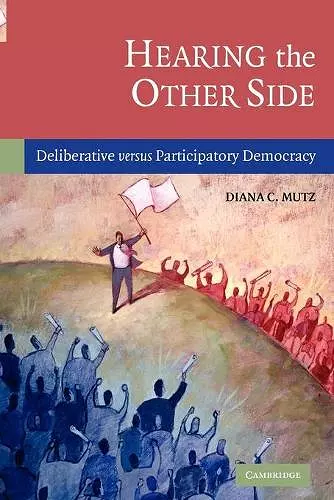Hearing the Other Side
Deliberative versus Participatory Democracy
Format:Paperback
Publisher:Cambridge University Press
Published:13th Mar '06
Currently unavailable, and unfortunately no date known when it will be back
This paperback is available in another edition too:
- Hardback£75.00(9780521847506)

This book examines the consequences - both positive and negative - of living in mixed political company.
Examines the consequences - both positive and negative - of living in mixed political company. Drawing on studies of Americans and their social networks, this book illuminates one of the key dilemmas of American politics: how to maintain a citizenry that is enthusiastically politically active, yet not intolerant of oppositional political perspectives.'Religion and politics', as the old saying goes, 'should never be discussed in mixed company.'And yet fostering discussions that cross lines of political difference has long been a central concern of political theorists. More recently, it has also become a cause célèbre for pundits and civic-minded citizens wanting to improve the health of American democracy. But only recently have scholars begun empirical investigations of where and with what consequences people interact with those whose political views differ from their own. Hearing the Other Side examines this theme in the context of the contemporary United States. It is unique in its effort to link political theory with empirical research. Drawing on her empirical work, Mutz suggests that it is doubtful that an extremely activist political culture can also be a heavily deliberative one.
"A small number of books make an important contribution. This one makes a profound one. Participating in politics can bring (modest) increases in tolerance of diverse views. But exposure to a diversity of views decreases participation in politics. The two contemporary ideals of democratic politics, deliberative and participatory democracy, it follows, conflict with rather than complement one another." Paul Sniderman, Stanford University
"Do you want a political system in which people actively participate or in which people discuss issues with diverse interlocutors? In Hearing the Other Side one of the most creative political scientists working today demonstrates that we cannot have it both ways since, according to varied and appropriate data, deliberation among the politically heterogeneous is inversely related to levels of participation in politics. Seen in this light, perhaps it is just as well that only 23 percent of Americans could recall having a political conversation with someone who disagreed with them. Diana Mutz's grounded, trenchant analysis of real political talk in the workplace and beyond shows why the study of deliberation must not be left to political theorists: it is a concept that appears much more attractive from the isolation of the ivory tower than from the bustle of the plant." John R. Hibbing, University of Nebraska-Lincoln
"This important new book presents the startling results of careful research into some basic issues in political philosophy. The findings ring true to personal experience, but call into question some widely accepted tenets of contemporary democratic theory. This well-crafted volume should make big waves in our national debate about democratic renewal, helping to set a new agenda--how to reconcile the tension between active citizenship and diversity." Robert D. Putnam, Harvard University
"Diana Mutz has hit yet another grand-slam with Hearing the Other Side: Deliberative versus Participatory Democracy. Readers will find it difficult, much like a good novel, to put this engaging and well-written book down. Successfully combining traditional political philosophy with empirical researchothers have tried, few have succeededProfessor Mutz offers a compelling argument why the two lofty democratic goals, active participation and considered deliberation, are incompatible. Hearing the Other Side will set a new disciplinary research agenda for years to come." James Kuklinski, University of Illinois, Urbana-Champaign
"This engagingly written and carefully researched book suggests that there may be an empirical tension between theories of deliberative democracy and participatory democracy." - Benjamin I. Page, Northwestern University
- Winner of Robert E. Lane - Political Psychology Section of the American Political Science Association.
- Winner of Goldsmith Book Award, Joan Shorenstein Centre on the Press, Politics and Public Policy, Harvard University.
ISBN: 9780521612289
Dimensions: 229mm x 152mm x 10mm
Weight: 270g
184 pages